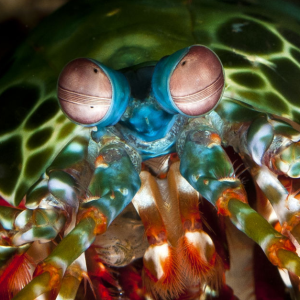The fish with a human-like face always swims to the diver when it hears the signal, allowing its benefactor to caress it and kiss its forehead.
Yoriko fish clings to its benefactor. Video: Great Big Story.
Hiroyuki Arakawa, a 79-year-old retired diver, has been regularly visiting Yoriko, an Asian sheepshead wrasse, for more than 25 years, according to Mirror .
Hiroyuki first met Yoriko at an underwater park south of Tokyo. Seeing that the fish was exhausted and unable to feed itself due to injuries, Hiroyuki began feeding it five crabs a day for 10 days until it recovered. From then on, he and the fish became attached.
Every time Hiroyuki dived into the waters where Yoriko lived, he would use a hammer to strike a gong to call the fish over. Hearing the signal, the fish would often come and swim around the diver, allowing him to pat its head and even kiss its forehead.
Hiroyuki said that Yoriko had a very human-like face in profile and he was sure the fish knew he was its savior. “I guess it knew I saved it when it was badly injured. I think anyone can get an animal’s attention by feeding them,” Hiroyuki said.

After her injury, Yoriko seemed to be in good health. The lifespan of the Asian wrasse is unknown, but the fish can grow up to a meter long.
A study last year concluded that fish have the ability to recognize faces. In the study, tropical basket fish were shown two images of human faces projected onto a screen above the tank and were trained to choose one of the two images by spitting water at it.
When the faces were mixed in with other photos, they could correctly pick out the face they were shown initially 81% of the time, even though the researchers stripped away many recognizable features like head shape and color. That rate rose to 86% when features like brightness and color were kept to a standard.
“Fish have simpler brains than humans and completely lack the part of the brain that humans use to recognize faces. Yet many fish exhibit impressive visual behaviors and are perfect subjects to test whether simple brains can accomplish complex tasks,” said Dr. Cait Newport of the University of Oxford, UK, a member of the research team.





